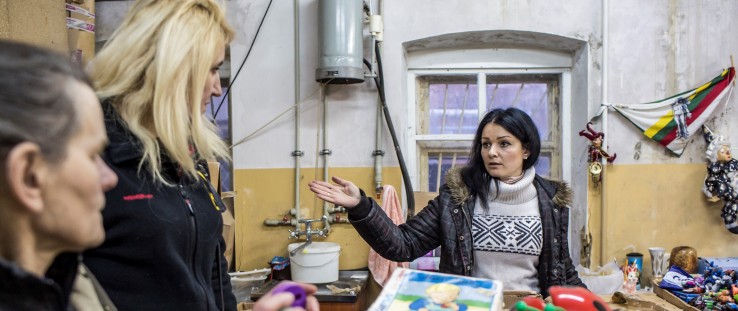 Volunteers donate and sort items for displaced people in Ukraine.
Brendan Hoffman
Volunteers donate and sort items for displaced people in Ukraine.
Brendan Hoffman
 Volunteers donate and sort items for displaced people in Ukraine.
Brendan Hoffman
Volunteers donate and sort items for displaced people in Ukraine.
Brendan Hoffman
KYIV, Ukraine—In the back corner office of the Free People House in Kyiv, Serhei* is taking his third call of the day on a hotline. On the line is a pensioner living in a front-line village in eastern Ukraine. Although she and her husband have survived more than two years amid the violence in Ukraine’s eastern region of Donbas, many others have left, and it’s getting harder and harder for the aging couple.
Humanitarian groups that provide basic necessities such as food, winter clothing and other supplies don’t always make it to her village because of the sporadic fighting. The pensioner asks Serhei if there’s anyone who could take her and her husband to a relative’s house outside of Kyiv.
“We have a network of volunteers who can help you,” Serhei assures her. “We just need to know where and when to pick you up.”
When the call ends, Serhei combs through a list of activists and volunteer organizations working in the pensioner’s region.
“We’ve been doing this for more than a year, and we have contacts with several groups who will drive to the front line to get her,” he said. “It’s just a matter of figuring out who can respond first.”
In November 2013, scores of Ukrainians took to the streets to protest President Viktor Yanukovych’s backtracking on his promise to sign a trade and association agreement with the European Union. In the wake of this “Revolution of Dignity” and formation of a new government, Ukraine experienced an explosion of volunteerism coming out of the movement’s civic activism. Thousands of grassroots organizations formed across the country to carry forward the momentum and meet the country’s new challenges and demands for change.
Before the protests erupted, Serhei, 43, a cellist from Kyiv, never thought about getting involved in activism or volunteer work. Like many Ukrainians, Serhei spent most of the first two decades after the breakup of the Soviet Union trying to survive in newly independent Ukraine’s transitioning economy.
But three years after the demonstrations snowballed into a series of unprecedented crises and challenges for Ukraine, Serhei now finds himself part of the country’s extraordinary mobilization of civil society and volunteerism. Ukraine’s civil society and volunteer movement have empowered a nation struggling to change the course of its post-Soviet history and, in so doing, have created a new sense of national identity.
One outlet for that is the Free People’s House in Kyiv, the first civil society one-stop shop in Kyiv for Ukrainians who have been displaced. With help from USAID, a coalition of volunteer groups rented a space in central Kyiv and began providing a wide range of services for internally displaced persons (IDPs)—everything from help in seeking employment to information about social and cultural activities in the capital. Free People’s House relies on volunteers, most of whom are veterans of the recent protests.
Some organized to address the immediate needs of a nation in crisis as the country struggled against Russian-backed separatists in the east.
“The values that initiated the Revolution of Dignity didn’t stop when the government changed. Ukrainians across the country embraced a new identity based around civic engagement, volunteerism and creativity, and have played an integral role in helping the country weather the turbulence of the past two years,” said Oren Murphy, Ukraine country representative for USAID’s Office of Transition Initiatives.
At the height of the upheaval, volunteers joined protesters, providing everything from sandwiches, tea, firewood, tents and sleeping bags, to old car tires used to fortify barricades that separated the protesters from the army of government riot police.
Shortly after Yanukovych fled Ukraine on Feb. 23, 2014, Russia purportedly annexed Crimea. A month later, Ukraine began a military operation to oust Russian forces and Russian-backed separatists who had entered the eastern regions of Donetsk and Luhansk. Both events sparked a massive exodus of Ukrainians from those regions. When Ukrainians saw that the state lacked the ability to address the country’s new challenges, thousands of volunteers stepped in.
“We saw a crisis before us, and we realized that if we wanted anything to get done, we’d have to do it ourselves,” Serhei said of the social activism that seemed to spontaneously ignite.
Volunteerism’s Second Wave
If Ukraine is a “nation of volunteers,” Dnipropetrovsk is the “capital of volunteerism,” said Olga Gorb, the volunteer coordinator for the Dnipropetrovsk regional government.
Dnipropetrovsk, situated in southeastern Ukraine just 155 miles from the eastern front line, is part of Ukraine’s heavily industrialized eastern corridor, much like now-occupied Luhansk and Donetsk. The city declared its pro-Ukraine stance soon after Russian forces and Russian-backed separatists began occupying government buildings across eastern Ukraine.
The city’s proximity to the front line meant many Ukrainians fleeing the conflict—which has claimed more than 9,000 lives—ended up here.
Volunteers mobilized to assist the hundreds of IDPs arriving daily. They raised funds to ensure hospitals were adequately supplied. They set up vocational training centers and business networking groups for entrepreneurs moving to Dnipropetrovsk from separatist-held areas.
Early in the eastern conflict, USAID was the first donor to support volunteer groups in Dnipropetrovsk, which helped local government and civil society come together and coordinate efforts. “Thanks to USAID, we were able to receive reliable information about the problems IDPs from the most remote parts of our oblast [region] face. The support enabled us to expand the number of volunteers who are helping to deliver this assistance,” said Vladyslav Makarov, head of the charitable foundation Dopomoga Dnipra, which USAID has supported.
What made Dnipropetrovsk different from other cities was the attention and support from the regional and city government, Gorb said. Local authorities organized forums and assistance for hundreds of local volunteer groups and civil society organizations.
Volunteer leaders admit that today their corps of volunteers is experiencing fatigue after responding nonstop to challenges over three years. In addition, frustrations are mounting across the country as the reform process haltingly moves forward and political infighting diverts focus away from efforts to fight corruption and bring peace to the eastern regions.
Ukraine’s volunteer movement remains a key highlight and resounding achievement of the Revolution of Dignity and the difficult ensuing years, said Murphy. Support from donors like USAID has been crucial in empowering and organizing the individuals who have dedicated their time and efforts to helping their fellow citizens and create a modern European and democratic Ukrainian state.
“We’ve learned how to create a system to solve problems with our own resources,” Gorb said. “At first, things were chaotic and we were merely surviving. Now, we are more systematic about our approach, and we know we can do anything.”
*Full name not available.







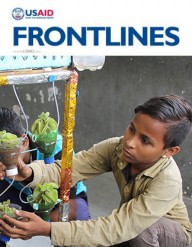

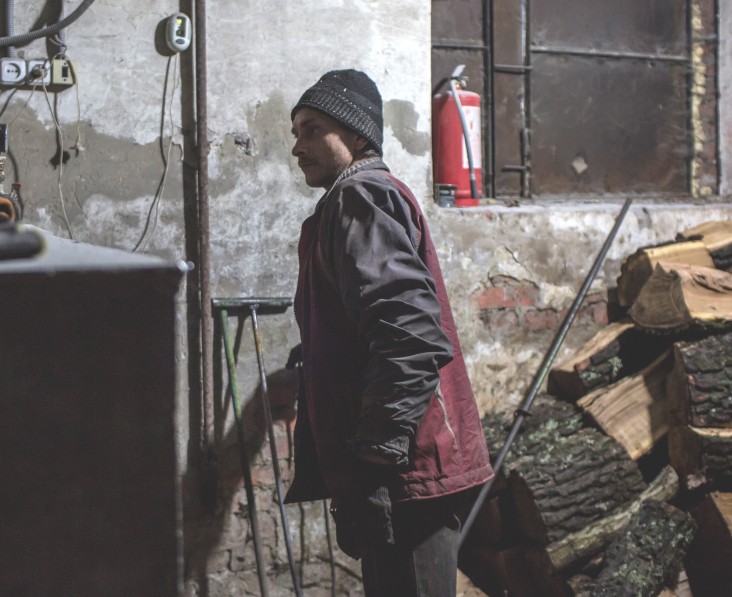
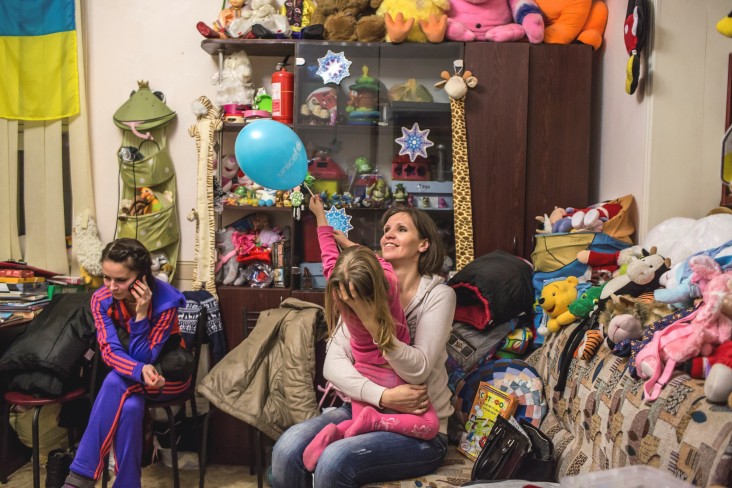
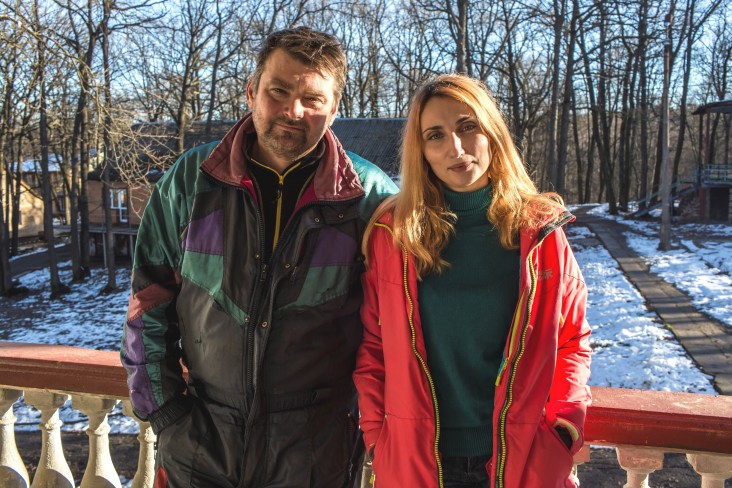
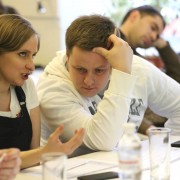
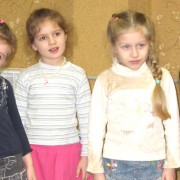
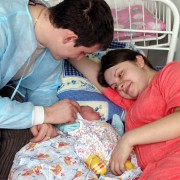
Comment
Make a general inquiry or suggest an improvement.